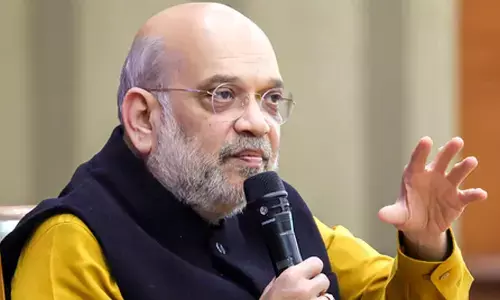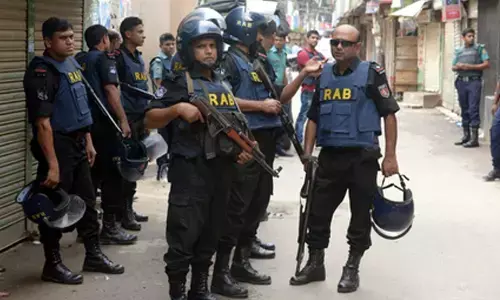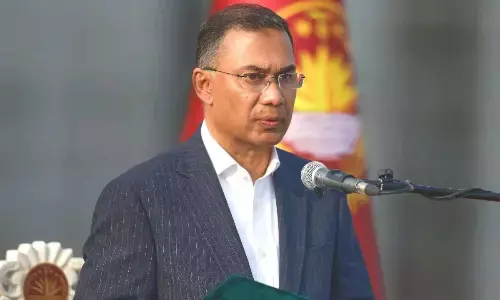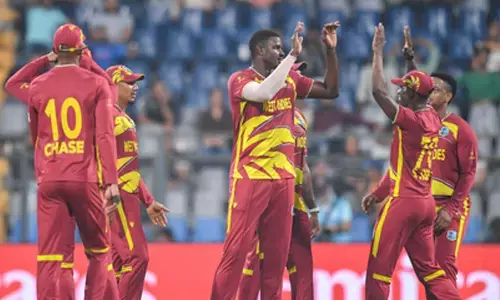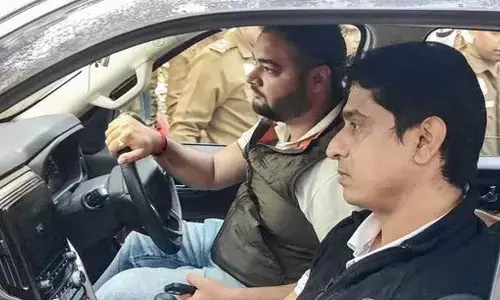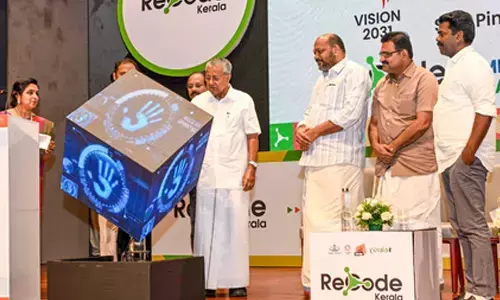At first, we barely knew what Rahul Gandhi thought. He hardly ever spoke, except during elections.
His interventions in parliament were erratic 'Kalavati' moments - headline grabbing narratives of sincere anguish that swiftly retreated into the mostly silent spaces from where they had suddenly emerged, just like the story of the Vidarbha widow who became a national name after he mentioned her, only to find that her life did not substantively change.
This year we know the Congress vice-president a little better. He still doesn't speak from anywhere but the ramparts of an election stage. In his disdain for and suspicion of the media, he has something in common with his chief challenger, Narendra Modi.
But, since taking charge of the party campaign, there is now a unifying pattern to his speeches. He is trying to position himself as the politician of the poor while nudging his rival into the camp of the corporates.
As a political salesman, the product he is attempting to pitch is empathy; he invokes the tragedies of how his father and grandmother were assassinated to seemingly make the argument that he can feel the pain of all those who suffer.
He has clearly shifted gears in the race against Modi. The earlier strategy to avoid framing the electoral argument in terms of a battle between secularism and communalism has been abandoned.
Unlike in Gujarat, where the Congress wasn't even willing to put Sonia Gandhi and her son on poll posters, to perhaps save them from being the defeated parties in a foregone victory, the national battle has seen Rahul pretty willing to wrestle in the gladiatorial ring. This week, he has tripped and stumbled on his own rhetoric after an embarrassing controversy has erupted around his claim that Pakistani agencies were trying to woo young Muslim boys brutalised in the Muzaffarnagar riots.
Even some Muslim clerics have criticised him for questioning the patriotism of the community. But on the chess board of political moves, the gambit has been played.
Having charged the BJP with "starting fires in Muzaffarnagar, Gujarat and Kashmir" he has set the stage for an election year that will witness one of the most polarising and volatile political clashes in recent memory.
In itself, Rahul Gandhi is entitled to his rhetoric, even to overstatement and oversimplification - both age-old weapons in all political armouries. The problem is less with the content (which the voter will be the ultimate judge of) and more with the persona that the party's future leader has adopted.
If you study all his speeches since he took charge as vice-president, kicking off his new assignment with the personal yet platitudinous anecdote of how his mother told him that "power is poison" Rahul Gandhi has consistently sought to appropriate the role of the rebel for himself.
In the demand that the ordinance to protect convicted politicians should be torn up and thrown away, Gandhi was clearly positioning himself as the disruptive force that would uproot the status-quoist culture of his own party. It's not that the Congress doesn't need this upheaval; it does. It's just that Rahul Gandhi, as the automatic, unquestioning inheritor of political power in his party is the ultimate Congress Insider. It's disingenuous for him to try and play the part of the Outsider. He simply cannot be both.
He could argue of course that he is trying to change the system from within, promising as he does that power will no longer be controlled and distributed by an influential minority.
But how can he miss the paradox of this formulation? He represents precisely that minuscule group that determines the fates and fortunes of others within the Congress without any robust interrogation of his own decisions from his peers.
While he has openly trashed dynastic politics, as long as he remains its most famous contemporary symbol, that critique seems flimsy. If a political meritocracy is his utopian ideal then let him start by announcing that he is not interested in the country's top job. In any case, those who know him say that's possibly true. So, let him say that his energies will be devoted not to the pursuit of prime ministership, but to building intra-party freedom.
In his speech in Madhya Pradesh, Rahul Gandhi indicated that he had been "asked" to put a "brake" on his plans to end the system of "political quotas" because of the impending elections.
During the Uttar Pradesh elections, it is said that Rahul Gandhi was keen to run as a contender for chief minister to indicate the seriousness of his commitment to the state, but was "asked" to focus on the national stage instead.
Notwithstanding the real pressure from his party base to run for PM, it's tough to believe that Rahul Gandhi can't get his way, if he is sure of what he wants. But the current ambivalence around his political ambitions makes the Insider-Outsider debate even more relevant.
The attempted disassociation can in fact be damaging for its selectiveness. For instance, the emotional reference to how his grandmother was murdered by the same men who taught him how to play badminton as a child would have been much more effective and moving, had he also followed it up with remorse for the thousands of Sikhs who were killed in the aftermath of her assassination.
To mention one, but remain silent about the other is to wear the scars of the tragedies of his political inheritance, without owning up to the accompanying mistakes.
The experience of growing up as the grandson of Indira Gandhi and the son of Rajiv Gandhi consigns Rahul Gandhi to an inescapable position of access and privilege. An Amitabh Bachchan like angry-young-man rebellion against its restrictions may first need a more genuine distance from the Establishment.
PM Modi is no longer a distant possibility
By all indications, the 2014 election is the BJP’s to lose. Thanks to the Narendra Modi effect and the Congress’s continued dalliance with desperate political and economic moves, the momentum is clearly in the BJP’s favour. Two opinion polls published today bear this out. While The Times Now-CVoter poll sees the BJP emerging as the single-largest party with 162 seats, The Economic Times poll with Nielsen, which concentrated on Uttar Pradesh and Bihar – which hold the key to 2014 – shows the BJP gaining ground. Nielsen predicts 44 seats for the BJP out of 120 in these two Hindi heartland states. Two things need to be commented upon. Both these polls are important as indicators of trend and momentum, but they are both likely to be wrong for the simple reason that many alliances and political equations could change before 2014. There is nothing like sure defeat to make the Congress want to align with former enemies, and there is nothing like overconfidence to make the BJP make mistakes. The other thing is this: the polls are probably erring on the side of under-estimating the BJP’s gains, again for the simple reason that the momentum is just beginning to build.
The BJP is shown to be making gains in Uttar Pradesh and Bihar on the back of the Modi effect, but this is at a time when Modi hasn’t even begun canvassing in these two states. This week and the next is when Modi will visit the two states. Despite talk of Modi peaking early, the truth is Modi is cannily choosing his engagements one at a time – he is surfacing roughly once or twice a month, which clearly does not amount to overexposure. His rallies will be ramped up only after the Assembly poll results are known in December. Other things being equal, I would expect the BJP to comfortably notch up its highest tally ever by crossing 180 seats; and with a little bit of effort and good planning, I would expect the seat tally for 2014 between Congress and BJP to be exactly reversed – with the BJP crossing 200 and the Congress falling to the low 100-plus levels. The big imponderables are really what will happen in Uttar Pradesh and Bihar, which are both multi-party races where seat counts can go haywire and gains go disproportionately with small vote share gains. The Economic Times poll shows the BJP vote share in Uttar Pradesh rising from 17 percent in 2009 to 28 percent, making it the single-largest gainer and most popular party in a four-cornered contest. In Bihar, the BJP’s vote share rises even more spectacularly from 14 percent to 33 percent. Since the tendency in voting patterns is to over-correct on the side of momentum, the chances are these trends will get accentuated as we come closer to the poll dates. This is what brought Akhilesh Yadav to power last year – a small swing gave him a clearly majority in terms of seats on a minority of votes – less than 30 percent.
The BJP is already at 28 percent in UP, according to CVoter. Between now and 2014, a lot of undecideds will make up their minds on who they think will win, and this trend is inherently favourable to the BJP under Modi because the mood is anti-incumbent. When you want to vote out a government, the chances are you will back the person most likely to beat the stuffing out of the Congress and UPA. Here the BJP stands alone. If the AC Nielsen poll is anywhere near correct, giving the BJP 28 percent and 33 percent in UP and Bihar in multi-cornered fights even before Modi has started campaigning means the BJP could well surprise us on the upside in these two states.
Of course, there are imponderables. The Congress can surely see the writing on the wall. Will it now swallow its pride and offer to play junior partner to Mayawati and Nitish Kumar in UP and Bihar? The second imponderable is whether the Yadav vote will splinter in UP and Bihar. The polls clearly show Mulayam Singh on the downswing with Muslims – who could defect to BSP and Congress, especially if they team up. They may defect to BSP anyway, even without the Congress in tow. In Bihar, a Nitish-Congress alliance will seal the Muslim vote, with the RJD, with its boss in jail, getting crunched between BJP and Nitish-JD(U).
This brings out the third imponderable: how will the dominant Yadavs vote if the Muslims have moved on? This is where the BJP will have to play its cards smartly. The Yadav-Muslim alliance of convenience is not an all-weather one. It depends on how Yadavs perceive their hold on power to be. If Mulayam Singh and Lalu Yadav look like potential losers, they will be open to enticement. They can’t go with Mayawati.
Will the BJP be able to bring them in? The Yadavs are Krishna-bhakts, and not exactly inimical to Hindutva. They entered into an alliance with Muslims because that was the route to power that Mulayam Singh and Lalu devised. Now, that could change. The BJP, having already consolidated the upper caste vote, is expecting the most backward class votes too to come, given the subtle play of Modi’s own most backward class status. One may presume that a Maya-Congress and Nitish-Congress alliance will dent the BJP bandwagon; but alliances have a way of creating counter-consolidations, and so one cannot predict that the combos will do any better than solos. In short, there is more than a 50 percent chance that the BJP will cross 200 seats under Modi. Prime Minister Modi is no longer a distant possibility.



